The King Holiday
In honor of Dr. Martin Luther King, Jr., we will not publish on Monday. We'll see you all again on Tuesday morning, January 17.
In honor of Dr. Martin Luther King, Jr., we will not publish on Monday. We'll see you all again on Tuesday morning, January 17.
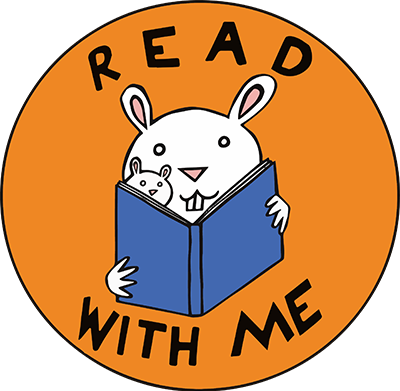 Read With Me children's bookstore will open in March at 111 E. Hargett St. in downtown Raleigh, N.C., the News & Observer reported. Owner Christine Brenner, a former teacher and school librarian, said she saw a need "for a place in downtown for families to experience together. I was fortunate to have teachers that inspired me and also to have a family that valued reading and always made sure I had access to books."
Read With Me children's bookstore will open in March at 111 E. Hargett St. in downtown Raleigh, N.C., the News & Observer reported. Owner Christine Brenner, a former teacher and school librarian, said she saw a need "for a place in downtown for families to experience together. I was fortunate to have teachers that inspired me and also to have a family that valued reading and always made sure I had access to books."
Brenner plans to hold writing workshops and offer book clubs and illustration classes at the store, which will also participate in the First Friday Art Gallery Walk. An IndieGoGo campaign is going live January 16 to help raise start-up funds.
Bill King, senior director of economic development & planning for the Downtown Raleigh Alliance, called the bookstore a great addition to the downtown retail environment, adding: "Children's books have been far more immune to the effects of e-readers, as parents and kids still love reading and interacting with actual books, so sales of children's books are increasing."
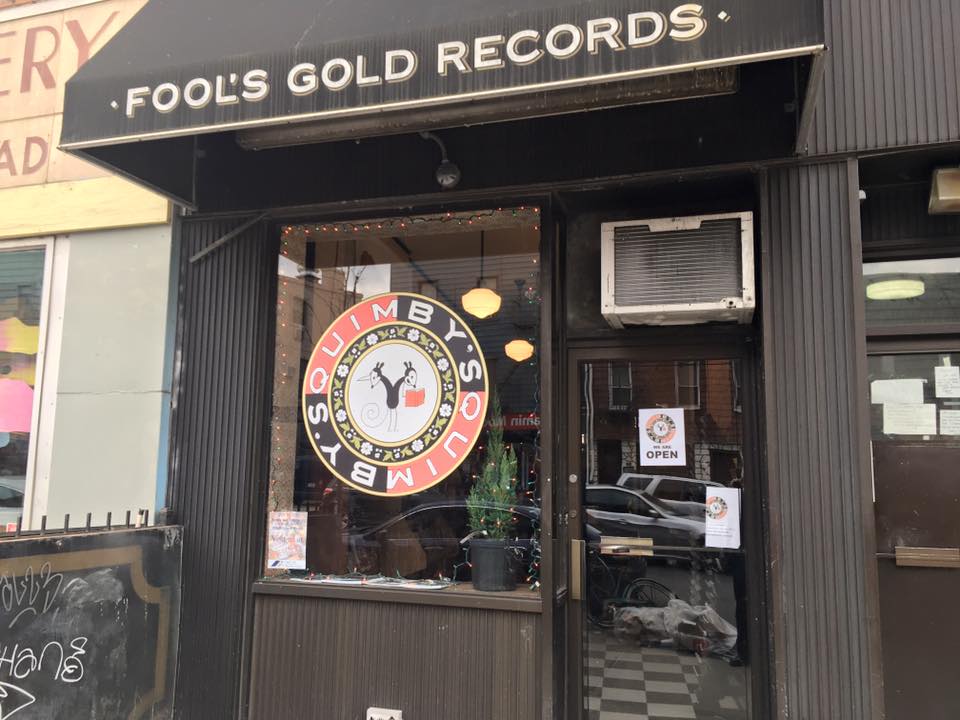 |
|
| via | |
Quimby's Bookstore, which recently celebrated its 25th anniversary in Chicago's Wicker Park neighborhood, will host a grand opening February 4 for a second location, at 536 Metropolitan Ave. in Brooklyn, N.Y. Founder and owner Steven Svymbersky will present a short slide show talk on the history of zines, followed by champagne and hors d'oeuvres.
Quimby's specializes in zines, alternative magazines and underground books. In December, Svymbersky opened the second Quimby's location next door to Desert Island Comics, which has been on Metropolitan Ave. for more than eight years.
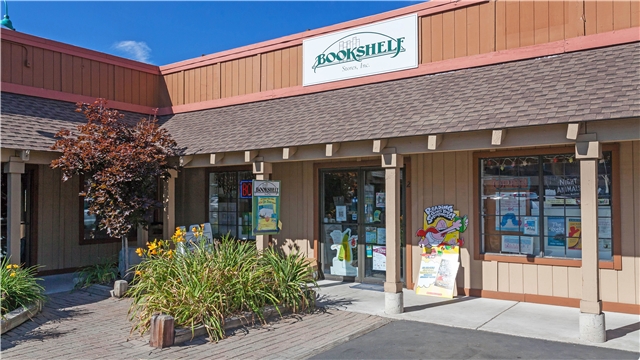 The Bookshelf in Truckee, Calif., which had struggled for the past few years to remain open, will close for good this month, the Sierra Sun reported. In 2013, owner Deborah Lane had said, "Down the road, we hope we have a future." By the fall of 2015, the bookshop was put up for sale, and last year, in September, Lane announced that the business was operating on a month-to-month lease.
The Bookshelf in Truckee, Calif., which had struggled for the past few years to remain open, will close for good this month, the Sierra Sun reported. In 2013, owner Deborah Lane had said, "Down the road, we hope we have a future." By the fall of 2015, the bookshop was put up for sale, and last year, in September, Lane announced that the business was operating on a month-to-month lease.
"The last economic downtown was pretty difficult, but people are actually coming back to bookstores, the numbers are starting to get better, and it's like too late--I'm already done," she said, adding: "We opened in June of '92, so we're not going to quite make 25 years. But I don't want to talk about that because I might cry."
The Bookshelf had also operated locations in Tahoe City and Quincy, but the former closed in 2012 and the latter was sold before that.
Lane expressed gratitude for the various community efforts that were launched to keep the store in business. "That was one reason I stayed open last year," she said, adding that she had hoped the store might sell, but negotiations were to no avail. "It kept us going, but the time comes when you have to make a choice. And since we didn't sell, it was time to retire and do other things and not have the stress of running my own business."
She also said she will miss the people most of all: "That's what it's all about--recommending books and having people love the books. It's all about the interaction, making a connection, helping people find books they might not otherwise find, because they're not exposed to it."
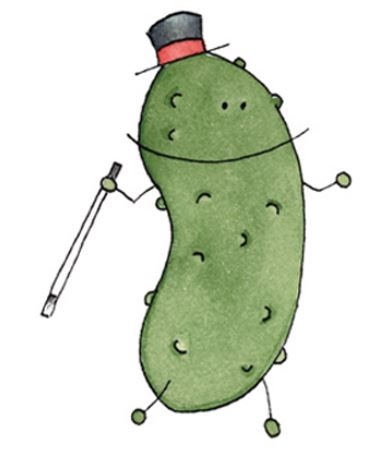
"There are opportunities for creating momentum and real change in this industry by having publishers band together to better support booksellers and authors," said Dominique Raccah, CEO and publisher of Sourcebooks. "I've greatly admired Rana's work for years. She has created something really extraordinary, and I am tremendously excited to join efforts with March 4th and the very talented Little Pickle Press authors."
DiOrio commented: "Dominique and her team embody so many qualities we admire--professionalism, entrepreneurialism, and kindness. We couldn't have wished for a better partner in furthering our mission to inspire character development in young people, and we are excited by the tremendous potential made available by our shared vision for the future."
Little Pickle Press is known for the award-winning picture book Your Fantastic Elastic Brain by JoAnn Deak (illustrated by Sarah Ackerley); an award-winning series that includes What Does It Mean to Be An Entrepreneur? and What Does It Mean to Be Kind?; as well as books by Shawn Achor, Elizabeth O. Dulemba and Coleen Murtagh Paratore.
Poet, writer and translator John Montague, who "was involved with the founding of Claddagh Records, which publishes traditional artists and leading literary figures in Ireland," died December 10, the Guardian reported. He was 87. The legendary Irish band the Chieftains took their name from his collection of short stories, Death of a Chieftain (1964). His many books include Collected Poems and The Rough Field. Montague became the first holder of the Ireland Chair of Poetry in 1998, and was made a chevalier of the Légion d'Honneur in 2010.
"Despite a vigorous final period--Smashing the Piano (1999), Drunken Sailor (2004), Speech Lessons (2011) and Second Childhood (due to be published in February 2017)--and the enviable succession of selected volumes (from Oxford University Press, 1982, Bloodaxe, 1990 and Penguin, 2001)--Montague aways seemed to be overlooked, overshadowed by those who influenced him, including his drinking companion and fellow walker Samuel Beckett, and those--like [Seamus] Heaney or Eavan Boland--whom he influenced," the Guardian wrote.
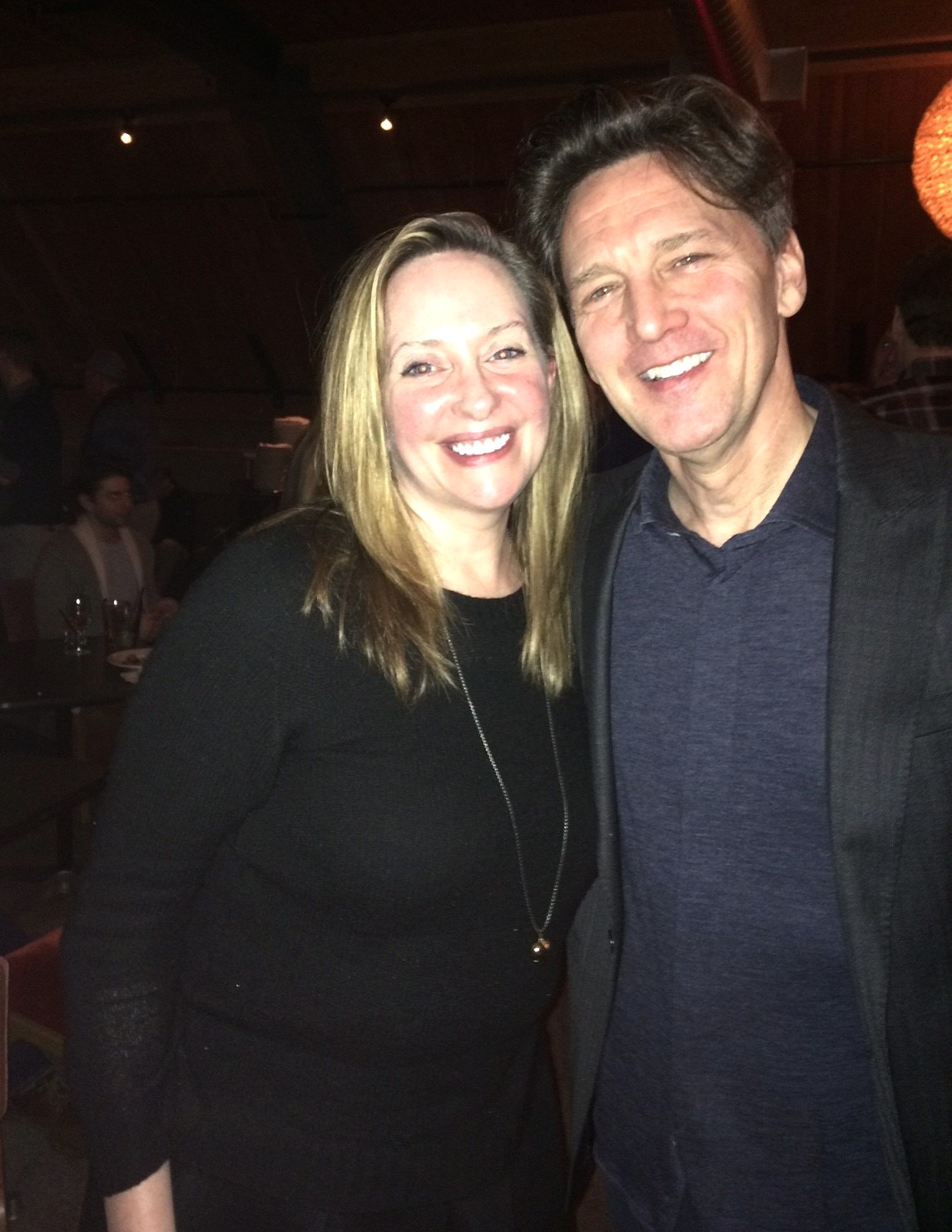 Pictured at a lovely Algonquin Books cocktail party in Seattle on Wednesday: Shelf Awareness publisher Jenn Risko and Andrew McCarthy, author of Just Fly Away (Algonquin Young Readers). Due out March 28, the book is the debut novel of the actor, director, National Geographic Traveler magazine editor at large and author of The Longest Way Home. Two other Algonquin authors joined the party: Lauren Grodstein (Our Short History) and Dave Boling (The Lost History of Stars).
Pictured at a lovely Algonquin Books cocktail party in Seattle on Wednesday: Shelf Awareness publisher Jenn Risko and Andrew McCarthy, author of Just Fly Away (Algonquin Young Readers). Due out March 28, the book is the debut novel of the actor, director, National Geographic Traveler magazine editor at large and author of The Longest Way Home. Two other Algonquin authors joined the party: Lauren Grodstein (Our Short History) and Dave Boling (The Lost History of Stars).
Poet, bookseller and publisher Gary Lawless is receiving the 2017 Constance H. Carlson Public Humanities Prize from the Maine Humanities Council, an award honoring "an individual, institution, or group in recognition of exemplary contributions to public humanities in Maine."
Lawless is the owner, with his wife, Beth Leonard, of Gulf of Maine Books in Brunswick, which the two founded in 1979. He also is the editor and publisher of Blackberry Books and has had 16 collections of his poetry published.
Lawless has encouraged others to find their voice with poetry, working with veterans groups, immigrant communities, and more. He works, too, with Spindleworks, an arts center in Brunswick whose mission is to help children and adults with disabilities achieve full and inclusive lives in their chosen community.
Lawless will be honored during a luncheon on March 24 at Bowdoin College.
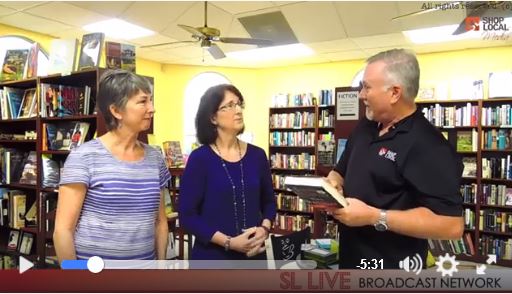
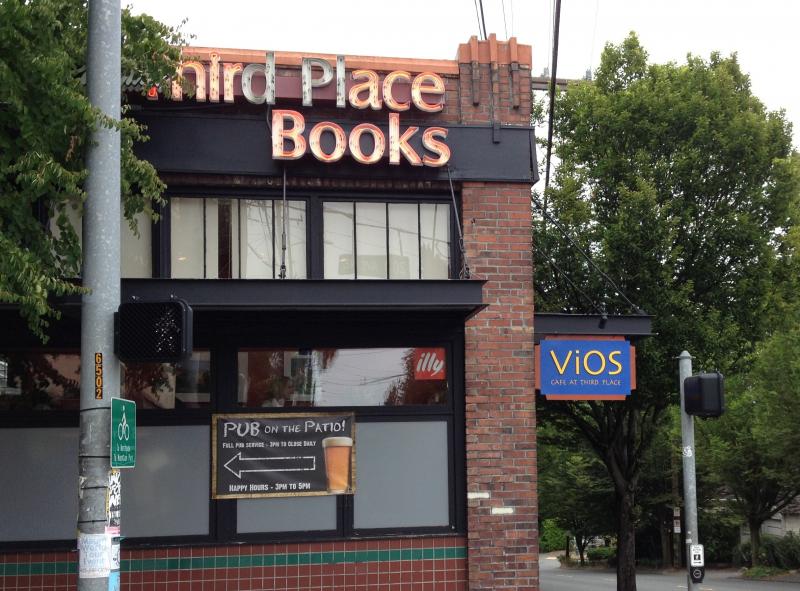 Noting that new bars "spring up in Seattle like weeds in sidewalk cracks," the Stranger reported "there's a new trend where people can find their favorite beverage in a place that speaks directly to the need for coziness, companionship, and intellectual fodder through the dark and damp Seattle winter: bars in bookstores."
Noting that new bars "spring up in Seattle like weeds in sidewalk cracks," the Stranger reported "there's a new trend where people can find their favorite beverage in a place that speaks directly to the need for coziness, companionship, and intellectual fodder through the dark and damp Seattle winter: bars in bookstores."
"The whole point is to build community," said Danielle Hulton, co-owner of Ada's Technical Books and Cafe, which recently added a cocktail bar and event space called the Lab. "Having food and drink helps."
Third Place Books "has devoted the basement and part of the main floor of its new Seward Park location, which opened in May 2016, to Raconteur, an all-day bar and restaurant by the folks from Flying Squirrel Pizza Co.," the Stranger noted, adding that the bookseller "was already a player in the bookstore bar game with the Pub at Third Place, a cozy, wood-paneled craft-beer spot below their Ravenna shop."
Although patrons can now sip rosé at Little Oddfellows in Elliott Bay Book Company, grab a beer at Ada's and drink cocktails at Raconteur, Third Place managing partner Robert Sindelar said the concept wasn't so accepted when the Ravenna pub first opened more than a decade ago: "It was slow to start. Initially, people wanted out of it what other bars in the neighborhood offered: Where's the pool table? Where's the dartboard? How cheap is your beer?" By the time Third Place prepared to launch its Seward Park space, a pub was part of the plan and the owners "brought in a different restaurant operator and different food offerings, and made the bar a more integral part of the store," the Stranger wrote.
Hulton noted that her customers at Ada's liked the Lab's concept immediately: "They wanted more space for community, to find different ways to interact with Ada's that plug in for them."
Caleb Thompson, who has managed the Pub at Third Place for more than a decade, agreed: "That's the whole ideal of the third place--you need somewhere to go to talk to people and relate.... You come in and it's like, there are so many of the things I love in one place! Why isn't this everywhere?"
At Scholastic Trade:
Effective January 23, Lauren Donovan will join Scholastic as director of publicity. She was previously assistant director of publicity at Penguin Young Readers.
Isa Caban has joined Scholastic as associate marketing manager. She was previously at Simon & Schuster Children's Publishing.
---
At Workman Publishing:
Rebecca Carlisle has been promoted to director of publicity for the Workman imprint adult list. She was formerly associate director of publicity for the Workman imprint.
Allison McGeehon has been named associate publisher of Artisan Books. She was formerly director of publicity and marketing at Artisan Books.
Jackie Burke has been promoted to publicity manager for Algonquin Books & Algonquin Young Readers. She joined the company a year ago from Portfolio, Sentinel, and Current at Penguin Random House.
Jenny Lui has been promoted to associate director of field sales of Workman Publishing. In this new role, she will manage all book retail field representatives and has the goal of growing the company's independent bookstore business. She will continue to sell directly to Urban Outfitters, Anthropology, Terrain and Bookazine.
---
At Chronicle Books:
Chelsea Masquelier has been promoted to sales coordinator, national specialty. Previously, she was sales assistant, mass markets.
Julia Guzzetta has joined the company as sales assistant, mass markets. Previously, she was a customer service representative at Hachette.
Today:
Fresh Air: Daniel Handler, aka Lemony Snicket, author of A Series of Unfortunate Events, which makes its debut today as a Netflix series. Handler wrote five of the eight episodes in the first season, which are adaptations of the first four titles in A Series of Unfortunate Events.
Tavis Smiley: Steve Jones, author of Lonely Boy: Tales of a Sex Pistol (Da Capo, $26.99, 9780306824814). He will also be on Late Night with Seth Meyers on Monday.
CNN's At This Hour: John Avlon, author of Washington's Farewell: The Founding Father's Warning to Future Generations (Simon & Schuster, $27, 9781476746463). He will also appear on CNN's Fareed Zakaria GPS on Sunday.
Monday:
Last Call with Carson Daly repeat: Simone Biles, co-author of Courage to Soar: A Body in Motion, A Life in Balance (Zondervan, $24.99, 9780310759669).
A new musical adaptation of Rick Riordan's novel The Lightning Thief "will be hoping to steal hearts Off Broadway this spring featuring rising stage star Chris McCarrell," the Associated Press reported. McCarrell, who has appeared as Marius in the recent Broadway revival of Les Miserables as well as Nibs in Peter Pan Live!, will play Percy Jackson.
"It's really going to push the envelope of (the) magic of theater. The world is so epic and it is so grand and it doesn't seem like you could portray that onstage, but that's really where the magic of theater comes in," said McCarrell. "When musicals are written for the sake of musicals, sometimes the world isn't fleshed out completely. So I really enjoy when behind that two-hour world there is this universe of hours of reading and hours of characters and movies and books and series. I always love when there's a universe behind the musical."
Written by Joe Tracz (Netflix's A Series of Unfortunate Events) and Rob Rokicki (the musical Strange Tails), the production begins at the Lucille Lortel Theatre in March. The Lightning Thief was previously adapted into a motion picture franchise and a graphic novel. In 2014, "it was turned into a one-hour musical by Theatreworks USA, but this new version runs into two acts, has a larger cast and will have a live band onstage," the AP noted.
What Works: Gender Equality by Design by Iris Bohnet (Belknap Press) has won the 800-CEO-READ Business Book of the Year Award for 2016. Bohnet is a behavioral economist at Harvard University, where she is a professor, director of the Women and Public Policy Program, and co-chair of the Behavioral Insights Group at the Kennedy School of Government.
800-CEO-READ praised the book for presenting "perhaps the most comprehensive roadmap ever written to making equality in the workplace a reality." And general manager Sally Haldorson said What Works "should be required reading for all leaders and managers in any organization because Bohnet offers applicable and executable advice that will make a real difference in how you achieve your goals for a diverse and equitable workplace, and, in turn, benefit from access to the full expanse of talent and opportunity available."
In addition, Hollis Heimbouch, v-p and publisher at Harper Business, won the third annual Jack Covert Award for Contribution to the Business Book Industry. Covert, founder and former president of 800-CEO-READ, said upon choosing Heimbouch for the award, "I always looked forward to seeing Hollis to find out what I was going to be selling the next season. Hollis has a great track record but she's never complacent. She's open to new ideas and constantly pushing the genre forward."
Under Heimbouch's leadership, Harper Business has published two 800-CEO-READ Business Books of the Year: 2011 winner Great by Choice: Uncertainty, Chaos, and Luck--Why Some Thrive Despite Them All by Jim Collins and Morten T. Hansen and 2014 winner The Intel Trinity: How Robert Noyce, Gordon Moore, and Andy Grove Built the World's Most Important Company by Michael S. Malone.
---
The winners of the Jewish Book Council's 2016 National Jewish Book Awards have been announced. The Everett Family Foundation Jewish Book of the Year Award was given to Israel: A Concise History of a Nation Reborn by Daniel Gordis (Ecco). Michael Chabon is the winner of JBC's Modern Literary Achievement Award "for his general contribution to modern Jewish literature, including his most recent work, Moonglow (Harper)."
Rose Tremain took the J.J. Greenberg Fiction Award for The Gustav Sonata (Norton). Lauren Belfer became the first recipient of the Debby & Ken Miller Book Club Award for her work And After the Fire (Harper); and Gavriel Savit won the Goldberg Prize for Debut Fiction for Anna and the Swallow Man (Knopf Books for Young Readers). Other winners and runners-up in several categories can be seen here. The winners will be honored on March 7 in New York City.
---
Jennifer L. Holm won the $5,000 Scott O'Dell Award, which recognizes a "distinguished work of historical fiction for young people published by a U.S. publisher and set in the Americas," for her novel Full of Beans (Random House Books for Young Readers ), the Horn Book magazine reported. The award was created in 1982 by O'Dell (best known as the author of The Island of the Blue Dolphins) and Zena Sutherland and is now administered by Elizabeth Hall.
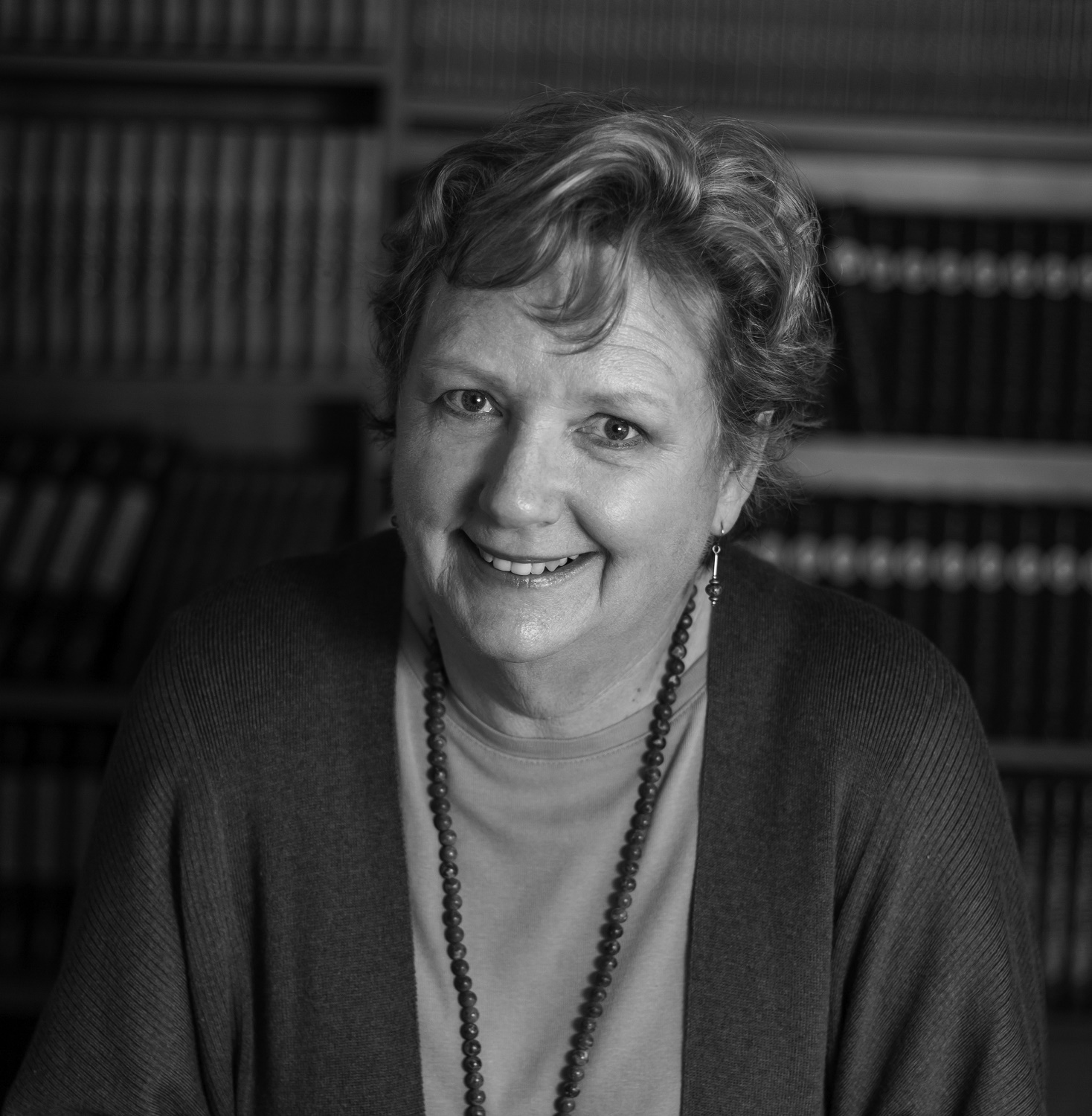 |
|
| photo: Tasha Thomas | |
Susan Rivers was awarded the Julie Harris Playwriting Award for Overnight Lows and the New York Drama League Award for Understatements. She is also the recipient of two playwriting grants from the National Endowment for the Arts and has had short fiction published in the Santa Monica Review. In 2007, she earned an MFA in fiction writing from Queens University of Charlotte in North Carolina, where she was also awarded a Regional Artist Grant from the Arts and Sciences Council. She lives and writes in a small town in upstate South Carolina. The Second Mrs. Hockaday (Algonquin, January 10, 2017) is her first novel.
On your nightstand now:
Roderick Hudson by Henry James (for James's difficulty, subtext)
The History of Wolves (galley) by Emily Fridlund (best debut novel I've read recently)
The Sympathizer by Viet Thanh Nguyen (funny, sick, sad)
Catullus' Bedspread by Daisy Dunn (a funny, sick, sexy thing happened on the way to the forum)
The Classical World by Robin Lane Fox (companion book for Dunn)
The Fabric of Defeat: the Politics of South Carolina Millhands, 1910-1948 by Bryant Simon (research for the book I'm writing now)
Favorite books when you were a child:
The bookmobile in my rural county had limited inventory, so I read some of the same books over and over: Hans Brinker, or The Silver Skates by Mary Mapes Dodge, My Side of the Mountain by Jean Craighead George, all of Grimm's fairy tales and the Wizard of Oz stories. I remember being obsessed with that Oz-rageously flashy dresser, Jack Pumpkinhead, to the point of imagining him as a potential mate. (And I just realized why I was a fan of David Bowie and Prince when I got older.)
Your top five authors:
This is going to sound very Harold Bloom-ish: top of the fiction pantheon are Jane Austen, Herman Melville, Thomas Hardy, Virginia Woolf and William Faulkner. That means I have to leave off writers savored in translation: Tolstoy, Kafka, García Márquez and Proust (only vol. 1--I'm not smart enough for the other six). I'm big on 150-year-old writers, clearly.
Book you've faked reading:
At my age I don't fake anything. It's so liberating.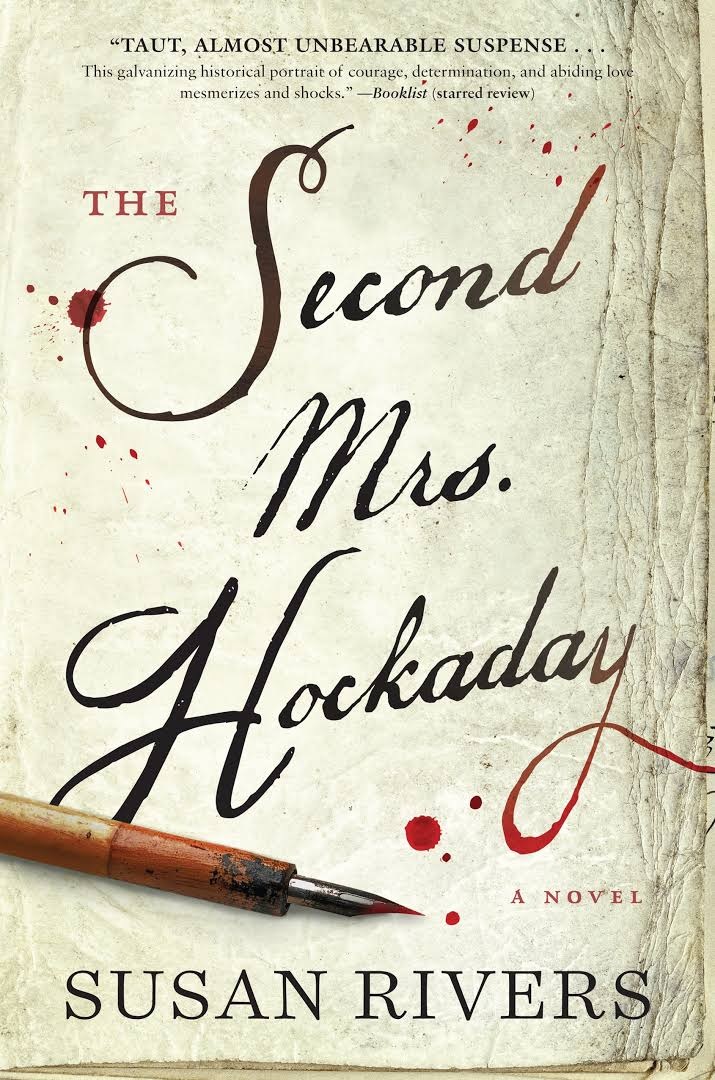 Books you're an evangelist for:
Books you're an evangelist for:
Hyperbole and a Half by Allie Brosh. If Kafka had taken in stray dogs and had worn a hoodie.
Miss Jane by Brad Watson. I love "quiet" books that are anything but. Watson's prose feels effortless, and that's the hardest to get right.
The Rug Merchant by Meg Mullins, about a doomed affair between an Iranian immigrant and a Barnard college student. Her characters--and her rug--haunted me for a long time.
Book you've bought for the cover:
Slade House, of course, by David Mitchell.
Book you hid from your parents:
Since my parents weren't literary there was no need to hide books from them. However, when I was 14, I was invited to spend the summer with a school friend who had moved to Belgium, and her well-read father invited me to make use of his library. Clearly, he hadn't expected me to pick up Terry Southern and Mason Hoffenberg's Candy; all hell broke loose when he saw me settled in an armchair with that book, laughing my head off. That was my first experience of censorship.
Book that changed your life:
I took Anglo-Irish Lit in college and the professor was gaga over W.B. Yeats. When I finished the course, I never again wanted to hear about widening gyres or ragged bone shops of the heart. But after graduation I was starving for my art in San Francisco's fringe theater scene, feeling restless and lonely. I went back to Yeats's Selected Poems and my head exploded. I wrote my first play about Yeats's unrequited love for Maud Gonne, and that production opened a lot of doors. Eventually I transitioned out of the theater into prose writing, but Willy B. remains my first love. His poems grow more powerful and more personal the older I get, like Shakespeare's sonnets.
Favorite line from a book:
From Vol. 1 (Swann's Way) of In Search of Lost Time by Marcel Proust:
"I have every useless thing in the world in my house [in Paris]. The only thing wanting is the necessary thing, a great patch of open sky like this. Always try to keep a patch of sky above your life, little boy."
I keep this passage pinned to the board above my writing desk, reminding me to hang on to that sky.
Five books you'll never part with:
When the end comes, they're going to have to rip a lot more than five books from my cold, dead hands. Here's what will be in my orange SIBA tote bag when the seven trumpets sound:
The Holy Bible, King James Version. If you're going to write about Southern lives, you've got to know your Bible. I came to it late, but I'm learning. The companion book to this needs to be Edith Hamilton's Mythology, because the Greeks did it all first.
Anna Karenina by Leo Tolstoy. I once had a writing instructor who insisted that the protagonist be introduced within the first few pages of a novel. I brought A.K. to class one day and showed him that Anna doesn't make an appearance until Chapter 18. He was not amused.
One Hundred Years of Solitude by Gabriel García Márquez. Fiction was never the same after this novel came out. I was never the same. Nothing was ever the same.
The Great Gatsby by F. Scott Fitzgerald. All the principals in Gatsby are profoundly unhappy and dissatisfied. So what's their plan of action? They pursue precisely those things that make them unhappy and dissatisfied. So American.
Jane Eyre by Charlotte Brontë and Wuthering Heights by Emily Brontë (boxed set). We didn't have much money growing up, which is why our mother used to take my sisters and me Christmas shopping in junkshops. In one of those shops my sister Caitlin bought me the 1944 Random House two-volume edition with the spooky Fritz Eichenberg woodcuts. Whenever I was sick in bed, I took out the box and read one of the novels from beginning to end. Cait's gone now and I no longer have time to lie in bed, so this set is extra-special.
Book you most want to read again for the first time:
Siddhartha by Hermann Hesse. I'd like to know if I'm remembering the ending correctly or if I'm confusing it with the final scene in Candy.
Best piece of advice you ever got about writing:
I took care of my dear mother in the final years of her life. In one of our last cogent conversations I told her that I'd finally finished my first novel. She asked, "How long is it?" I told her it was 650 pages. "Oh my!" she said. "I guess some people don't know when to shut up."
I kept that in mind when I wrote The Second Mrs. Hockaday; it's fewer than 300 pages. And I probably should have kept that in mind when I answered these questions.
We Were the Lucky Ones by Georgia Hunter (Viking, $27 hardcover, 416p., 9780399563089, February 14, 2017)
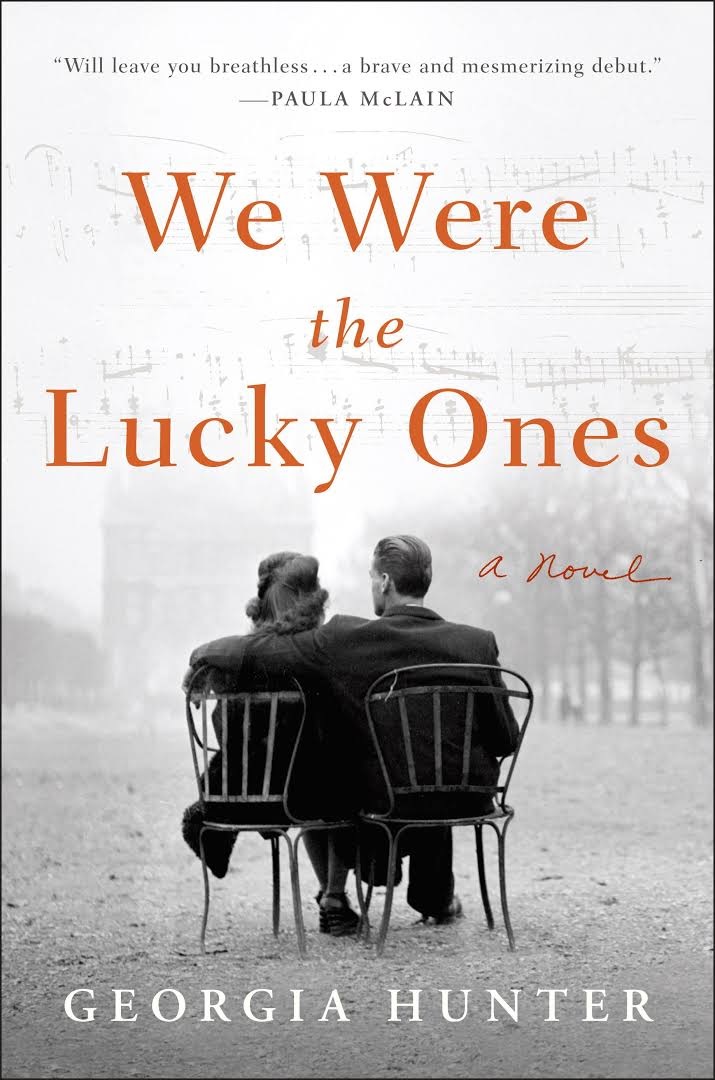 Set in World War II, Georgia Hunter's debut novel, We Were the Lucky Ones, is based on actual events in her family. At 15, Hunter discovered her family had once lived in Radom, Poland, and had been persecuted for being Jews. Her desire to know more led Hunter to conduct years of interviews with family members, friends and other Holocaust survivors as well as extensive research of the war through movies, books and stacks of records. The story Hunter tells through the eyes of her grandparents, great-grandparents and other relatives is one of amazing endurance, bravery, determination and unwavering love.
Set in World War II, Georgia Hunter's debut novel, We Were the Lucky Ones, is based on actual events in her family. At 15, Hunter discovered her family had once lived in Radom, Poland, and had been persecuted for being Jews. Her desire to know more led Hunter to conduct years of interviews with family members, friends and other Holocaust survivors as well as extensive research of the war through movies, books and stacks of records. The story Hunter tells through the eyes of her grandparents, great-grandparents and other relatives is one of amazing endurance, bravery, determination and unwavering love.
In early 1939, young Addy Kurc is living in Paris, enjoying the music and food of the city on his days off from work as an engineer. Although he's far from his family in Poland, he knows he'll return to share Passover with his parents and siblings. Then a letter arrives from his beloved mother, begging him to stay where he is, not to attempt to cross German borders because it's dangerous to do so. He realizes his mother is not telling him everything and that he's missed or ignored clues that indicate unrest and hostility toward Jews. It will be many years before Addy sees his mother again.
Meanwhile, his sisters, brothers and parents are facing their own dangerous situations. On September 1, 1939, Hitler invades Poland and begins his systematic annihilation of the Jewish population of Europe. Within weeks, the Red Army takes over the eastern part of Poland. Forced into ghettos or shipped off to Siberia, family members struggle to get through one more day under the harshest of conditions. Severe cold during the winter, intolerable heat in the summer, little to no food for days at a time and the constant fear of deportation to one of the many "work" camps--which are no more than death zones--take their toll, but each Kurc is determined to survive. Each has his or her own hell to live through, whether bombings, beatings, fierce battles or months of hidden confinement, but, miraculously, they emerge scarred but alive.
Hunter does an excellent job of bringing history to life, with just enough gruesome details of what happened during the Holocaust while conveying the desires and hopes of the Kurcs as they fell in love, got married, and had children during this horrific period. --Lee E. Cart, freelance writer and book reviewer
Shelf Talker: This story of one family's incredible ability to stay alive during the Holocaust is based on true events.
Many (most?) book people have had "the dream." They imagine what it would be like to own a quiet little bookshop in a quaint town and have the time to indulge in long conversations with patrons that went beyond handselling. Maybe they could spend quality time exploring the shop's bookshelves for lost treasures or just leisurely tidying up. They might sip tea and read an old book for a quiet hour. Although I was a bookseller for almost 15 years in a big indie, even I fantasized occasionally about that other, simpler booklife.
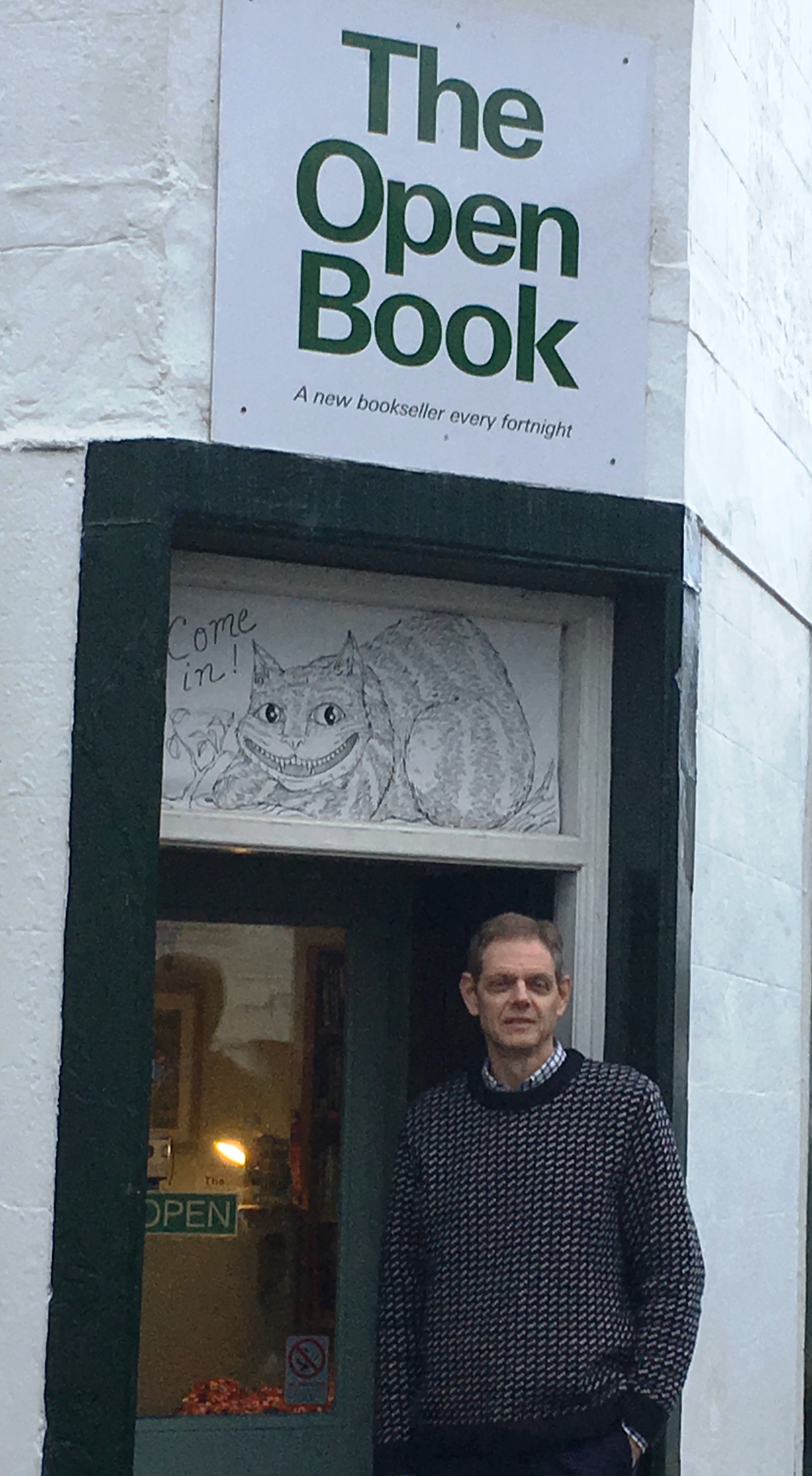 But Fred Powell, owner of Main Street Books in Frostburg, Md., and his wife Kathy are actually living the dream this month. Shortly after the holidays, they arrived in Wigtown, Scotland's National Book Town, to assume temporary proprietorship of the Open Book, a unique Air BnB option that offers a "bookshop holiday/residency experience" running a used bookshop.
But Fred Powell, owner of Main Street Books in Frostburg, Md., and his wife Kathy are actually living the dream this month. Shortly after the holidays, they arrived in Wigtown, Scotland's National Book Town, to assume temporary proprietorship of the Open Book, a unique Air BnB option that offers a "bookshop holiday/residency experience" running a used bookshop.
Sponsored by the Wigtown Festival, the program allows guests to "play-bookshop for a week or two. We'll give you your very own bookshop, and apartment above, supported by a team of friendly volunteers and bookshop sellers to make your trip as lovely as possible.... Residents will be expected to carry out all the normal duties of a bookseller including: opening/closing the shop during normal working hours, welcoming visitors, selling books, staffing, stocking, creating awesome window displays and basically putting your own stamp on the shop."
But why, you may wonder, would a professional bookseller be tempted to pay for the privilege of being... an amateur bookseller?
 Powell recently told me he "first learned of the Open Book from a story I read in Shelf Awareness probably two years ago. A recently retired man in publishing wrote about his stay in the book shop. I investigated the idea with Kathy, my wife, and my bookstore staff--who are running my store in Frostburg while I run the Open Book in Wigtown. With both my wife's academic calendar--she teaches in the Social Work Department at Frostburg State University--and the book store schedule, January 2017 looked to be the best time to come to Scotland. I think I signed up for this adventure about a year and a half ahead of my arrival."
Powell recently told me he "first learned of the Open Book from a story I read in Shelf Awareness probably two years ago. A recently retired man in publishing wrote about his stay in the book shop. I investigated the idea with Kathy, my wife, and my bookstore staff--who are running my store in Frostburg while I run the Open Book in Wigtown. With both my wife's academic calendar--she teaches in the Social Work Department at Frostburg State University--and the book store schedule, January 2017 looked to be the best time to come to Scotland. I think I signed up for this adventure about a year and a half ahead of my arrival."
The Wigtown Book Festival organization owns and stocks the bookshop with second-hand titles and guests provide the labor. "You sign on for your week or two through Airbnb," Powell noted. "You do pay for staying in the upstairs apartment but it is minimal. I was responsible for all the arrangements to arrive in Wigtown from flights, rental car and hotel. We came early and spent five days in Edinburgh and two days along the coast in Ayr and Stranraer before our arrival in Scotland's Book Town. All together I will be away from my store for almost a month."
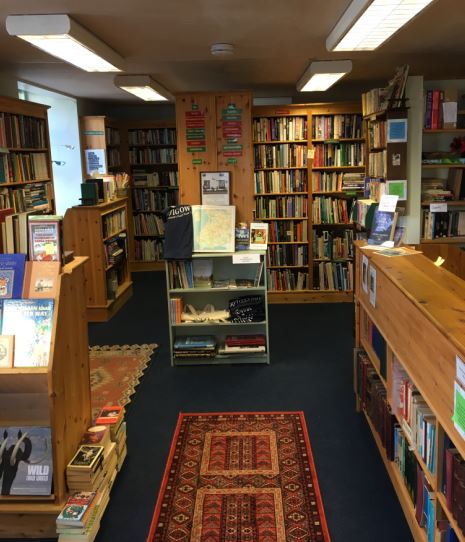
My earlier question--Why would a professional bookseller be tempted to pay for the privilege of being an amateur bookseller?--was answered eloquently by Powell: "My motivation for coming to the Open Book is twofold. One is to spend time in a country where the common language for both me and the Scots is books. Secondly, I am at a point in my bookselling career--having just celebrated my store's 27th anniversary--that I need to get excited about the book world again and start learning new ideas to bring back to my store in Western Maryland. In just the first week, both of my motivations are being met."
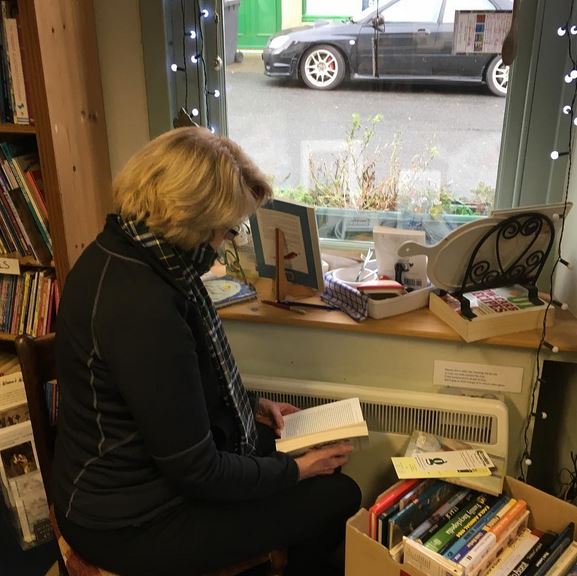
Sold.
Words to live by: On the Open Book's blog, Kathy Powell's first post (January 3) noted that the "flat is very spacious and the book shop well stocked. We were planning on opening tomorrow at 10 a.m. for after-holiday sales, but we already had our first customers today while we were getting settled in the shop. Our first sale was one mystery book for £1.5. Bookselling is not bookselling is not bookselling! Every shop is different and all customers are not alike."